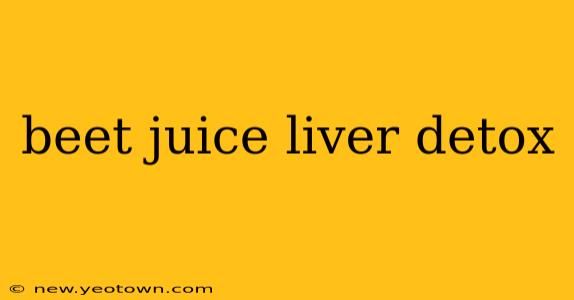The vibrant crimson hue of beet juice has captivated attention for centuries, not just for its striking color, but also for its purported health benefits. Recently, it’s gained significant traction as a natural liver detoxifier. But is beet juice truly a liver-cleansing miracle worker, or is this just another wellness trend? Let’s delve into the science and separate fact from fiction.
My name is Dr. Evelyn Reed, and I've spent years researching the impact of nutrition on liver health. While I can't offer medical advice, my expertise allows me to provide informed insights into the potential benefits and limitations of beet juice for liver health.
What are the purported benefits of beet juice for liver health?
Beetroot, the root vegetable behind the juice, is packed with nutrients, including nitrates, antioxidants (like betalains), and various vitamins and minerals. These components have been linked to several health benefits, some of which might indirectly support liver function.
The key component often cited in relation to liver health is nitrate. Nitrate is converted into nitrite in the body, which then transforms into nitric oxide. Nitric oxide is a potent vasodilator, meaning it widens blood vessels. This improved blood flow can, theoretically, enhance the liver's ability to receive oxygen and nutrients, and to eliminate waste products. However, it's crucial to understand that this is an indirect effect, and more research is needed to firmly establish a direct link between beet juice and improved liver detoxification.
Does beet juice help cleanse the liver?
This is a complex question. The liver is a remarkably efficient organ with its own highly effective detoxification system. It doesn't require "cleansing" in the way some detox products suggest. The liver constantly filters and processes toxins from the blood. Beet juice itself doesn't directly “cleanse” the liver in the way some marketing materials claim. However, the nutrients in beet juice may support overall liver health by contributing to better circulation and providing antioxidants that combat oxidative stress, which can damage liver cells.
Can beet juice improve liver enzyme levels?
There's limited direct evidence to suggest beet juice directly impacts liver enzyme levels. Liver enzyme levels (like ALT and AST) are often used as indicators of liver health. Elevated levels can signal liver damage. While some studies suggest beet juice may have antioxidant effects that could indirectly protect the liver from damage, more research is needed to definitively establish a link between beet juice consumption and improved liver enzyme levels.
Is beet juice safe for the liver?
For most people, moderate consumption of beet juice is considered safe. However, individuals with certain medical conditions should exercise caution. For instance, those with kidney stones should be mindful of the oxalate content in beets. Beet juice can also interact with certain medications, so it’s crucial to consult your doctor before incorporating it into your diet, especially if you have pre-existing health conditions or are taking medication.
What are the potential side effects of beet juice?
While generally safe, beet juice can cause some side effects, particularly in higher quantities. These include:
- Altered urine color: Beeturia, the reddish-purple discoloration of urine, is common and harmless.
- Gastrointestinal issues: Some people may experience diarrhea or upset stomach.
- Low blood pressure: Due to its vasodilatory effects, beet juice can lower blood pressure. This is usually beneficial for those with high blood pressure, but it could be problematic for individuals with already low blood pressure.
How much beet juice should I drink for liver health?
There's no established recommended daily intake of beet juice specifically for liver health. Moderate consumption is key. Start with small amounts and observe how your body responds. Remember, beet juice shouldn't be considered a replacement for a healthy diet, regular exercise, and proper medical care.
Conclusion: A Supporting Role, Not a Miracle Cure
Beet juice, with its rich nutrient profile, may offer indirect support for liver health by improving circulation and providing antioxidants. However, it's not a miracle cure or a replacement for a healthy lifestyle and proper medical attention. Before making significant dietary changes, especially if you have concerns about your liver health, always consult your doctor or a registered dietitian. They can provide personalized advice based on your individual needs and health status. The information presented here is for educational purposes only and should not be considered medical advice.

